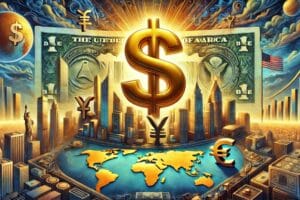Donald Trump threatens 100% tariffs against countries that abandon the US dollar. De-dollarization, led by the BRICS, represents a challenge to American economic leadership, igniting a heated global debate on currencies.
Let’s see all the details in this article.
Former President Trump promises 100% tariffs against those who abandon the US dollar
De-dollarization, or the process of reducing dependence on the US dollar as a global reserve currency, has become one of the central themes of international economic debate.
This movement, promoted by emerging nations, represents a response to the perception of an excessive American control over the global financial system.
In this context, the former president of the United States Donald Trump has announced drastic measures to counter this trend.
In a recent post on Truth Social, Trump declared his intention to impose 100% tariffs on countries that decide to abandon the dollar in favor of other currencies.
The message was particularly directed at the BRICS countries (Brazil, Russia, India, China, and South Africa), which have recently intensified efforts to promote alternative currencies, including the possibility of creating a new shared currency.
The BRICS bloc has taken a leading role in this initiative, expanding its coalition with new members such as Egypt, Ethiopia, Iran, and the United Arab Emirates.
Among the proposed strategies are the increase of trade exchanges in local currencies and the creation of a common currency that could challenge the dominance of the US dollar.
According to the leaders of the BRICS, this transition aims to ensure greater economic autonomy and to reduce dependence on financial mechanisms dominated by the United States.
However, Trump’s announcement underscores the importance that the United States places on maintaining the dollar as the main currency of global trade.
The dichiarazioni di Trump
In his message, Trump harshly criticized the BRICS countries, stating that the United States will not remain idle in the face of their attempts to move away from the dollar:
“We require a commitment from these countries that they will neither create a new BRICS currency nor support any alternative to the mighty US dollar.”
The former president also warned that countries challenging the dollar will have to “say goodbye” to the American market, emphasizing that 100% tariffs will represent a significant deterrent.
“Possono cercarsi un altro idiota,” ha dichiarato Trump, expressing his skepticism about the possibility of a concrete success of de-dollarization.
Despite the growing efforts of the BRICS, the US dollar maintains a dominant position globally. According to the International Monetary Fund (IMF), the dollar still represents 58% of the world’s currency reserves.
Furthermore, the trade of crucial commodities such as oil occurs predominantly in dollars, reinforcing the centrality.
However, the growing dissatisfaction among emerging and developing economies towards the US control over the international financial system is fueling the de-dollarization movement.
The critics of the dollar highlight how dependence on the American currency can make economies vulnerable to market fluctuations and the monetary policies of the United States.
What prospects are there for the future?
In any case, Trump’s statements represent a clear signal: the United States do not intend to lose the role of global economic leader without a fight.
However, de-dollarizzazione is a complex phenomenon, which requires time and significant coordination among the nations involved.
In other words, the future of the dollar will depend on the ability of the United States to maintain global confidence in its economy and the stability of the currency.
At the same time, the BRICS countries will have to demonstrate that an alternative system can guarantee concrete benefits at a global level.
In a rapidly evolving international landscape, the challenge between the US dollar and emerging currencies could redefine the economic and political balances of the next decade.


